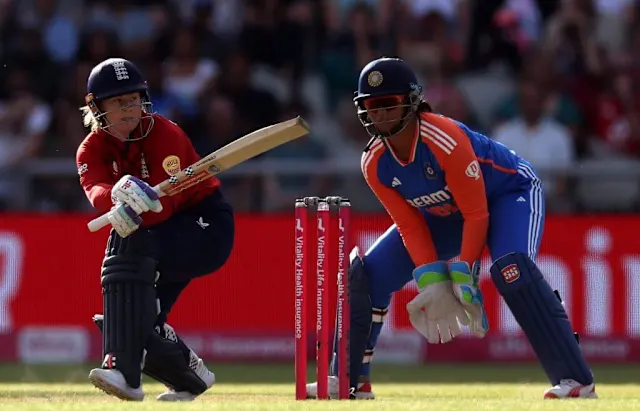Gurinder Chadha, the filmmaker who broke new ground with her hit film Bend It Like Beckham, is now setting her sights on a new sporting passion — cricket. Known for blending cultural identity, humor, and sports into relatable cinematic experiences, Chadha has never shied away from bold transitions. Her current shift from the world of football to cricket signals more than just a change in athletic focus; it reflects a deeper engagement with heritage, legacy, and global storytelling.
From Beckham’s World to Boundary Lines
Bend It Like Beckham wasn’t just a movie about a girl playing football; it became a cultural landmark. Released in 2002, it captured the journey of a British-Indian teenager battling gender and cultural expectations while chasing her dream to play professionally. The film sparked conversations around race, gender roles, and immigrant identity, reaching audiences far beyond the UK.
Fast forward two decades, and Chadha is again stepping into the world of sport — this time trading football boots for cricket bats. Her interest isn’t arbitrary. Cricket holds a far more layered cultural resonance for Indians and South Asians globally. For many, it’s not just a sport; it’s a thread that ties generations together. Chadha’s pivot toward cricket feels like a return to roots, an embrace of heritage through a modern cinematic lens.
Why Cricket Now?
The timing of Gurinder Chadha’s focus on cricket coincides with the rising global popularity of the sport, especially formats like the IPL (Indian Premier League) and The Hundred. More importantly, women’s cricket has seen a dramatic rise in recent years, mirroring the underdog journey showcased in Bend It Like Beckham.
Chadha’s new cricket-themed project is reportedly inspired by real-life stories of female cricketers of Indian descent. It intends to capture not just their athletic grit but also their navigation of cultural expectations, family ties, and global ambition — themes that have long been Chadha’s strength. The choice of cricket as the central motif appears deeply personal and culturally charged, offering fertile ground for storytelling.
As part of this shift, Chadha has already begun working on a film that charts the journey of women entering the traditionally male-dominated arena of South Asian cricket. In this context, the director’s decision to move into cricket aligns with her broader goal of spotlighting stories that often remain buried beneath mainstream narratives.
Cultural Reflections Through Sport

Sport has always served as a metaphor in Chadha’s work. Whether it’s the soccer field representing freedom in Bend It Like Beckham, or the cricket pitch symbolizing generational conflict and reconciliation in her upcoming venture, Chadha uses sports not just for drama but to make powerful cultural statements.
Cricket, in particular, offers a layered playground. The colonial history, national pride, class dynamics, and gender politics surrounding the sport make it an ideal canvas for storytelling. Through her lens, cricket becomes more than a bat-and-ball game; it becomes a space for dialogue — about identity, agency, and change.
In an interview, Chadha hinted that this new project isn’t about “copying Beckham with cricket.” Instead, it’s about finding new emotional truths and character arcs that speak to a different generation and a different set of societal shifts. Where Beckham celebrated cultural hybridity in a Britain grappling with immigration and integration, her new film looks at the legacy of colonial sports, female resilience, and the South Asian diaspora’s evolving identity.
Authentic Voices and Real Stories
One reason Chadha’s sports films resonate is their authenticity. With Bend It Like Beckham, the character of Jess felt real because she was pulled from the everyday lives of young British-Asian women. Chadha has said she aims to do the same with her cricket film. Rather than romanticizing or exaggerating the journey, she wants to ground it in the lived experiences of real women.
By collaborating with former female cricketers, sports historians, and cultural advisors, she’s taking steps to ensure that her narrative remains both engaging and accurate. These aren’t just stories of triumph on the field but off-field struggles involving tradition, independence, and global opportunity.
This kind of attention to authenticity also allows the film to reach a wider audience. While cricket may have South Asian roots, its themes — particularly when framed through the experiences of women — have universal resonance. Whether you’re a teenager in Mumbai, London, or Melbourne, the dream of achieving something despite the odds is a shared one.
The Keyword: Bend It Like Beckham Legacy Lives On
Though Gurinder Chadha is moving away from football, the spirit of Bend It Like Beckham endures in her upcoming work. The characters may change, and the sport may be different, but the heart remains the same — strong, hopeful, and rooted in real lives. Her ability to craft stories that celebrate cultural nuance while staying universally relatable continues to set her apart in global cinema. As she gears up for her cricket-centered feature, fans of her work can expect a film that’s as heartfelt and impactful as the one that made her a household name.
Her pivot is not a departure but a continuation. She’s still telling stories about identity, courage, and community — only now, the pitch is made of turf instead of grass, and the sound of celebration comes not from a goalpost but from a boundary line. Her legacy as a director who can weave sport into cinematic emotion remains strong, and her next chapter promises just as much relevance and resonance.
For those eager to follow Chadha’s new direction, the news comes with a nostalgic thrill. After all, the woman who helped audiences Bend It Like Beckham might now teach the world how to bat it like a legend.





